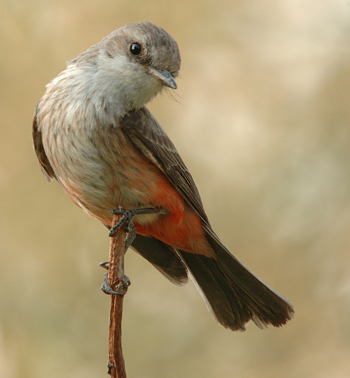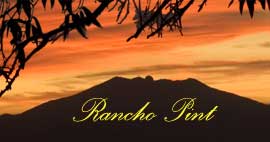|
By John Pint
 In
early 2011, the Primavera Forest Service (in the state of
Jalisco, Mexico) announced the publication of “Aves del Bosque
La Primavera—Guía Ilustrada” (Illustrated Guide to the Birds of
the Primavera Forest) by Oscar Reyna Bustos. This long-awaited
book is, according to nature photographer Jesús Moreno, “The
fruit of many years of hard work and a great deal of time spent
in the field.” In
early 2011, the Primavera Forest Service (in the state of
Jalisco, Mexico) announced the publication of “Aves del Bosque
La Primavera—Guía Ilustrada” (Illustrated Guide to the Birds of
the Primavera Forest) by Oscar Reyna Bustos. This long-awaited
book is, according to nature photographer Jesús Moreno, “The
fruit of many years of hard work and a great deal of time spent
in the field.”
The new guide is, indeed, jam-packed with 197 color photos and
descriptions of birds you can spot in the Primavera Forest, from
plain wrens and sparrows to more exotic or curious birds like
the Lesser Roadrunner, the Mexican Parrotlet and the Painted
Bunting. By the way, from this book I learned that the latter is
called Colorín Sietecolores in Spanish, but Oscar Reyna’s
detailed description of this beautiful bird suggests it proudly
displays at least ten different colors, despite its name.
Let me start off by mentioning that even though this bird guide
is in Spanish, it includes the English names of all the birds
listed and its excellent photos will be extremely useful to
speakers of any language. The book appears to have been
published by the author with the financial backing of the city
of Zapopan and the collaboration of the Primavera Forest
Service, as well as the University of Guadalajara. It’s a
paperback with 221 glossy pages and convenient front and back
flaps for marking your place. It measures 22.5 by 15 by 1.2
centimeters and weighs around half a kilo.
 Each
bird gets a page all to itself with a color photo, description
and the other basic information all in Spanish. In addition,
there are helpful silhouettes (by Karina Aguilar) of the 15
orders of birds represented. The heading of each page includes
the order and family of the bird along with its Spanish, English
and scientific names. Each
bird gets a page all to itself with a color photo, description
and the other basic information all in Spanish. In addition,
there are helpful silhouettes (by Karina Aguilar) of the 15
orders of birds represented. The heading of each page includes
the order and family of the bird along with its Spanish, English
and scientific names.
According to Mexican ornithologist Enrique Valdez, “Field guides
for small areas like the Primavera Forest or Los Colomos present
certain advantages: they are lightweight and easy for beginners
to use without the bewildering options that could cause a birder
to start banging his head against a tree. The disadvantages:
they’re only good for one particular place and don’t include
accidental species which often pop up.”
Fortunately, in this case, Oscar Reyna has taken pains not only
to include the Primavera Forest’s 162 “residents” but also 35 of
these “accidental species,” bringing the total number of birds
covered to 197.
Oscar Reyna decided to illustrate his book with color
photographs, a choice that surely cost him many years of
patience, sweat and tears (especially where he has caught both
the male and female of the species in the same picture). While
photos show the birds as they really are, they don’t let us see
all the essential details, as do drawings…but, then, coming up
with 197 accurate drawings may be an even more daunting task
than taking 197 quality photos of shy, elusive birds.
One notable problem with this book is that it does not have an
alphabetical index. So, if your nephew Gerardo shouts, “Caray! I
think I just saw a kingfisher!” there is no easy way you can
quickly go to the photo of a Green Kingfisher on page 87 of this
book. No, you are obliged to start hunting through a seven-page
list of the book’s 197 birds, a list organized by order and then
by family. This means you could only find that Kingfisher if you
knew that it is a Cerylina of the family Alcedinidae of the
order Coraciiformes. Well, if you happen to know all that, you
are surely not a principiante (beginner), for whom this
book was written.
To rectify this error, I have typed out an alphabetized list of
the English names of these birds with the page numbers you need.
This is a Word document you can print out at home after
downloading it from here. Then you
can paste it in the back of the book.
Despite this omission, the new bird guide is a great book and
the price is most reasonable: 150 pesos. You can pick it up at
the Park
Service office in CONCENTRO (Av. Vallarta No. 6503 at
the Periférico) in Guadalajara. They’re open from 9:00 to 4:00
weekdays, 9-2 on Saturdays, TEL 31-10-09-17. You can find their
office (Local E-38) easily by going into the main entrance of
the building (on Vallarta and surrounded by banks) and turning
left as soon as you pass a small water fountain. Keep your eyes
on the offices to your left. The Bosque’s is the only one with
flower pots and “little deer” outside the door.
While you’re at CONCENTRO, you might also want to sign up for
the Club de Observadores de Aves de la Primavera, which includes
beginning, intermediate and expert birdwatchers and meets
monthly (or contact Francisco Leon, fleon@bosquelaprimavera.com).
But don’t wait too long. The number of people who can attend the
monthly session is limited.
|

